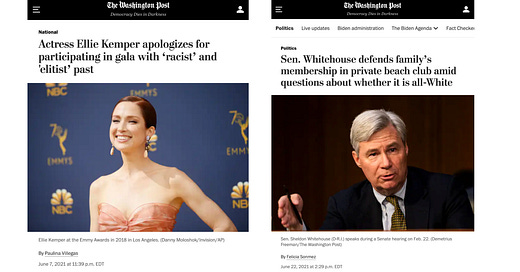Sheldon Whitehouse’s All-White Club Membership Exposes Media’s Faux Wokeism
Sometimes the media’s wokeness puts it to sleep.
Over the weekend, Democratic Senator Sheldon Whitehouse was interviewed by GoLocalProv News in his home state of Rhode Island about his connections to Bailey’s Beach Club in Newport. According to GoLocalProv’s previous reporting, Whitehouse pledged to give up his membership in 2006 when he ran for the Senate, but the local news organization discovered in 2017 that the senator had simply transferred his stake in the club to his wife. While there are conflicting reports about whether or not the historically all-white club remains so, it was clear from Whitehouse’s response that he believes it to still be the case.
GoLocal interviewed Whitehouse on Friday in Pawtucket and when asked if the private club had admitted any minorities since GoLocal first raised the issue in 2017, Whitehouse said, “I think the people who are running the place are still working on that and I’m sorry it hasn't happened yet.”
Further, when asked if such racially stratified clubs should still exist, Whitehouse replied “It's a long tradition in Rhode Island and there are many of them and I think we just need to work our way through the issues, thank you.”
There are a lot of reasonable ways Whitehouse could have answered these inquiries; how he chose to do so wasn’t one of them.
But the media’s response, or lack thereof, is telling as well. Although the story spread quickly through right-leaning and conservative outlets, mainstream outlets were much slower on the uptake as I noted on Twitter, and a number of major news organizations continue to ignore the news. Below are screenshots of Google searches from Tuesday afternoon:
In the time since my initial tweets, NBC News caught up with the story, and CBS News came on board too. The New York Times chose to report the story in a Live Politics thread simply as one item Monday evening in a “Here’s what you need to know” list. MSNBC linked to the NBC News article in a bullet in their “Campaign Round-Up” post today.
It may seem churlish to fault major outlets for waiting mere hours or days to cover a story like this -- except that far less clear-cut stories generated far more light and heat just recently--both on social media and in the mainstream press.
Consider The Washington Post, which appears to have been the first major outlet to cover the story Monday afternoon.
Their headline treats the central controversy as ambiguous -- “amid questions about whether it is all-White” -- obscuring the fact that Whitehouse himself did not dispute the characterization.
As several commentators have noted, the tone of that coverage was in stark contrast to another recent ‘controversy’: actress Ellie Kemper’s having won, as a teenager, a pageant affiliated with a group that had been all-white before she was born.
While I haven’t (yet) seen any instances of the “conservatives seize on” or “Republicans pounce” style of coverage of the Whitehouse story, what coverage does exist shares with that widely lampooned genre the palpable sense that the press resents having to acknowledge the story at all. And why is that?
As GoLocalProv noted, Whitehouse has been quite outspoken about “systematic racism” in this country:
The Senator has spoken out about the injustice of systematic racism in America. On June 4, 2020, after the deaths of George Floyd, Ahmaud Arbery, and Breonna Taylor Whitehouse said in a statement, “We hear the voices of the peaceful protestors who have marched. We can and must do better to root out systemic racism in its many forms."
In other contexts, the press might consider such apparent hypocrisy an aggravating factor. In this case, readers would be justified in wondering whether Whitehouse’s usefulness as an outspoken pitchman for progressive politics explains their reluctance to put him in a difficult spot. Whitehouse has earned the nickname “Senator Whiteboard” for his baroque Senate floor presentations on topics like conservative money in politics, or alleged illicit influences on the Supreme Court. They’re the sort of YouTube clip, cable news soundbite legislating that has become all too common on both sides of the aisle, and no doubt effective at keeping a certain segment of the Democratic base righteously indignant. But imagine if Ted Cruz or Tom Cotton were facing similar allegations to Whitehouse, and any other news yesterday would have had trouble breaking through the audible gasping.
If the news media is going to mend its reputation, assignment desks are going to have to resist the temptation to allow party and/or ideology to be a determining factor when deciding whether or not to cover a story, how to frame the story if covered, and the zeal with which it is pursued. The response to this skeleton that has tumbled out of Sheldon Whitehouse’s closet (again) is not encouraging.









